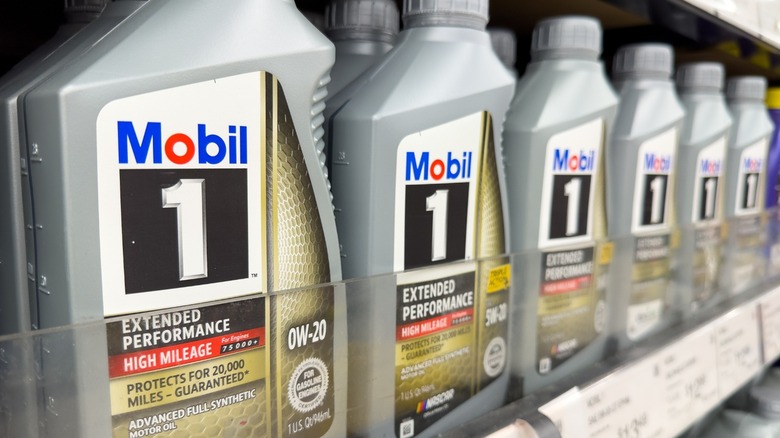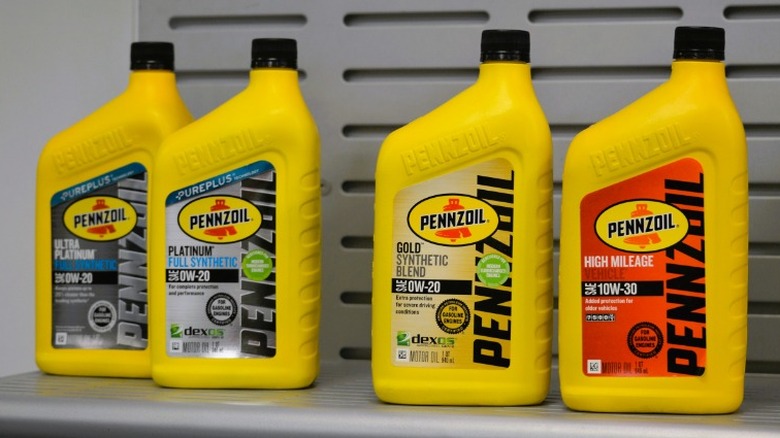What Is High Mileage Engine Oil & Does It Make A Difference?
Selecting the right engine oil can be challenging. Between the various different brands and the confusing numbers and oil classifications, you may feel overwhelmed while staring at hundreds of bottles on the shelf at your local auto parts store. To make matters even more confusing, there's synthetic and conventional oil and specialty varieties like high performance oil and high mileage oil. High mileage oil, in particular, is one that you may hear about more often. Maybe your mechanic has even recommended that you start using it in your car. But what is it?
High mileage engine oil is designed for vehicles with 75,000 miles or more on the odometer. While all engine oil is designed to lubricate internal components, absorb heat, and prevent damage, high mileage engine oil is engineered specifically for older engines. That's because, as they age and accumulate more mileage, engines begin to develop wear and tear. Even if you maintain your vehicle perfectly, that wear is still going to develop, and even if you keep your engine bay showroom clean, the motor could have serious issues on the inside, like leaky seals or a buildup of engine sludge.
That's where high mileage oil comes into play. These oils are designed specifically to combat those problems and contain special ingredients like detergents, seal conditioners, and anti-wear additives. Those extra ingredients can help older engines function more smoothly and slow down the development of age-related malfunctions.
But does high mileage engine oil actually make a difference? As a former automotive repair tech and a lifelong car fanatic, I'll break it down for you.
Why do many mechanics and car experts recommend high mileage engine oil?
If you own a vehicle with more than 75,000 miles on the odometer, you may be wondering if it's time to make the switch to high mileage engine oil. As mentioned, high mileage oils are designed for older engines. However, it may be helpful to explain what happens to engines as they age before we go deeper into high mileage oil.
The inside of an internal combustion engine is an extremely violent place. Between the small explosions that give these machines their power and the massive amount of rapidly moving parts, your engine's internals are subject to a near-constant state of controlled chaos. Controlled is the key word here, as all of that violence is actually supposed to happen and is, in reality, what makes your car's wheels turn.
However, just because the engine is working normally doesn't mean it won't develop wear and tear over time. Automakers and engineers go to a lot of trouble to minimize the amount of wear our engines develop during normal use, but they can't eradicate wear altogether. That means that as you put more and more miles on your vehicle, certain internal engine components will begin to degrade. That's especially true in the case of non-metal or rubber components like seals, which can break down and fail as they age.
The other thing that can happen to your engine over time is the development of grime, sludge, and increased friction. Each of those issues is problematic for your car and can cause things like internal or external oil leaks, overheating, and performance drops, which leads us back to high mileage engine oil.
Does high mileage engine oil make a difference?
High mileage engine oil can help stave off serious damage and wear if used properly. If your engine has high mileage — at least 75,000 miles or more — but is otherwise in solid condition, then using high mileage oil can help prevent things like oil leaks and overheating and help your engine run cleaner, though it won't eradicate normal wear. However, if your engine is already in an extremely rough state, high mileage oil isn't going to magically fix the problem.
Rather, high mileage engine oil is designed to prevent — not fix — some of the more serious issues that can develop as an engine ages. That means that if you're someone who takes meticulous care of your car, keeping up to date with routine maintenance and avoiding irresponsible driving, then using high mileage engine oil is a logical and smart choice. Alternatively, if your vehicle already has oil leaks, regularly overheats, or is just in overall poor condition, then high mileage oil may not make much of a difference.
All of that said, the price difference between standard oil and high mileage oil is negligible. That means that if your car has more than 75,000 miles, there's really no reason not to opt for the latter. Even if your vehicle is in rough shape, using high mileage oil is a smart move, as it may be able to delay more extreme damage, even if it can't prevent it completely.


